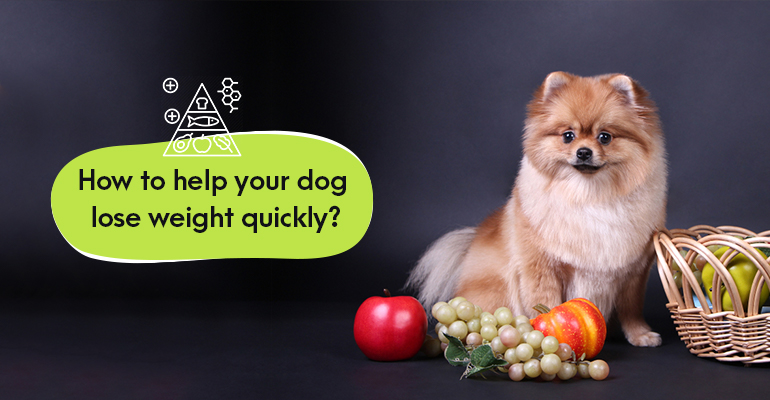How to Help Your Dog Lose Weight Quickly?
Pet obesity is on the upswing in the United States, with a plethora of pet foods that are available in every imaginable flavor to satisfy your pet’s taste buds. Weight management is a rising concern among pet parents, and whether you are a new dog parent or an experienced one, some of these questions are sure to have crossed your minds:
- How to keep my dog in shape?
- How to help my dog lose weight?
- How much should I feed my pet?
- How many calories does my dog need?
- Can treats make my dog overweight?
There’s a simple answer to all such concerns: by managing calories.
Here, in this blog, we’ll discuss how to manage your furry friend’s weight by managing calories in their diet.
But First, What are Calories?
The concept of calories in pets is the same as in humans. A calorie is a unit of energy obtained from the food we eat, and one calorie is defined as the amount of heat needed to raise the temperature of one kilogram of water by one degree Celsius.
[Also Read] 5 Healthy Ways Ensuring Longer Life For Dogs
How Many Calories Does a Dog Need?
A dog’s diet and calorie intake can be regulated mostly based on the dog’s weight. To keep a dog at its optimum weight, you should feed between 20 to 30 calories per pound of bodyweight every day.
However, other factors like a dog’s age, activity level, and whether it is spayed or neutered also matter a lot. Highly active dogs like hunting dogs or service dogs need more calories than their lazy counterparts. A Maltese puppy may require 300-350 calories per day, whereas a Rottweiler or German shepherd may require 1800-2500 calories per day.


You can also take the help of the online calorie calculators available online to get the exact breed-specific calculation for your dog’s breed, or you can also take the help of your veterinarian for the same. Once you know how many calories your dog needs, simply track its daily intake. If your dog is overweight, you should create a calorie deficit diet for them.
Tips to Keep Your Dog’s Weight in Control
- Rich Diet
In order to help your dog shed a few pounds, feed a nutritionally rich, high protein, and low-fat diet.
- Cut Down Carbs
If you are creating a calorie deficit diet for your dog, try to cut down carbohydrates, as proteins are crucial for muscle build-up.
- Reduce Portion Size
Feeding smaller portions multiple times a day will help your dog feel less hungry than feeding two big meals a day.
- Feed the Right Fats
Although a low-fat diet is recommended for weight loss, make sure you’re feeding the right fats like Omega 3 fatty acids in adequate amounts.
- Digestive Supplements
A healthy gut is the first step to maintaining an optimum weight. Digestive Supplements like Protexin Pro-Kolin Plus and Laxapet Laxative Gel available in the market can aid in the digestion process by maintaining healthy microflora in your dog’s gut and preventing constipation.
- Start Small
Don’t make drastic changes to your dog’s diet. Try to reduce the amount by 5% for the first week, and then gradually reduce the amount so your dog loses weight without experiencing any health issues.
- Weigh Your Dog
While managing your dog’s weight, it is essential to weigh your dog regularly, but don’t weigh it unnecessarily as it may cause needless stress if it is not losing weight fast.
- Keep track of treats
All dogs love receiving treats often, and we don’t want you to cut back on that love that your pooch receives. However, all you can do is simply reduce the size of the treats and try to feed treats that are low on calories. You can also use natural treats like baby carrots or blueberries.
- Exercise
Last but not least, the best way to help your dog lose weight is to help him burn calories. Walking, swimming or a simple game of fetch for a few minutes a day can help a lot to keep your dog in shape.
Read More: 5 Reasons: Why Your Dog Needs Exercise
Conclusion
While a balanced diet and regular exercise go hand in hand for weight loss, the best weight loss plan is the one that works best for you and your pet both. It is our duty to assist our dogs in maintaining a healthy weight since they solely rely on us for what they eat. We hope that these simple tips will help you out in your dog’s weight maintenance journey.




